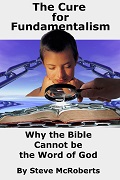
|
|
Chapter 25: Lamentations
Lam:1:17: Zion spreadeth forth her hands, and there is none to comfort her: the LORD hath commanded concerning Jacob, that his adversaries should be round about him: Jerusalem is as a menstruous woman among them.
In typical denigrating fashion, the Bible writer likens the sorry fate of Israel to that of a menstruating woman. I guess he thought you couldn't get much lower than that.
Lam:1:22: Let all their wickedness come before thee; and do unto them, as thou hast done unto me for all my transgressions: for my sighs are many, and my heart is faint.
Elsewhere in the Bible we are told to "do unto others as you would have them do unto you." (Mt. 7:12) But here we have a different slant on that idea. The writer prays that his god will do unto other nations as he had done unto Israel. In other words he wished evil upon others and fully expected that his god would grant such a wish.
Lam:3:26: It is good that a man should both hope and quietly wait for the salvation of the LORD.
Lam:3:27: It is good for a man that he bear the yoke in his youth.
Lam:3:28: He sitteth alone and keepeth silence, because he hath borne it upon him.
Lam:3:29: He putteth his mouth in the dust; if so be there may be hope.
Lam:3:30: He giveth his cheek to him that smiteth him: he is filled full with reproach.
So, it seems that Jesus was not entirely original when he said to "turn the other cheek." The writer of Lamentations here advocated that victims of physical abuse should silently bear their abuse. But why should that be? Who does that benefit? How does it make the world a better place?
Victims of physical abuse have a right to speak up and report their abusers and demand to be treated with respect. But the Bible does not advocate victims' rights: it advocates suffering in silence. No wonder those in power have encouraged the common people to believe in the Bible: it discourages them from fighting back.
Lam:5:7: Our fathers have sinned, and are not; and we have borne their iniquities.
This simply could not have been true according to another part of the Bible:
Ezek:18:20: The soul that sinneth, it shall die. The son shall not bear the iniquity of the father, neither shall the father bear the iniquity of the son: the righteousness of the righteous shall be upon him, and the wickedness of the wicked shall be upon him.